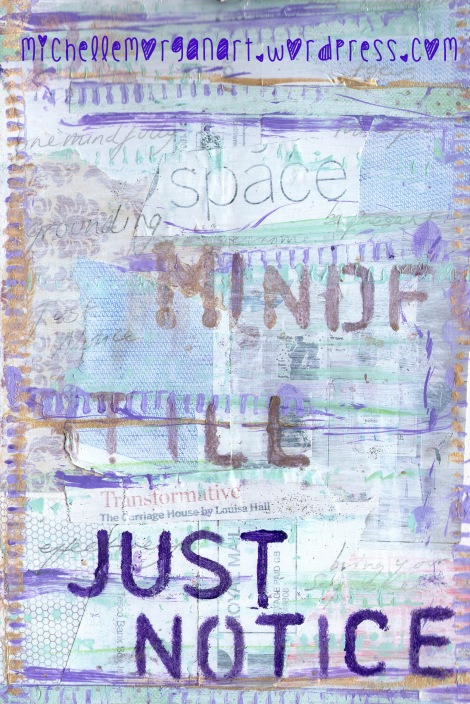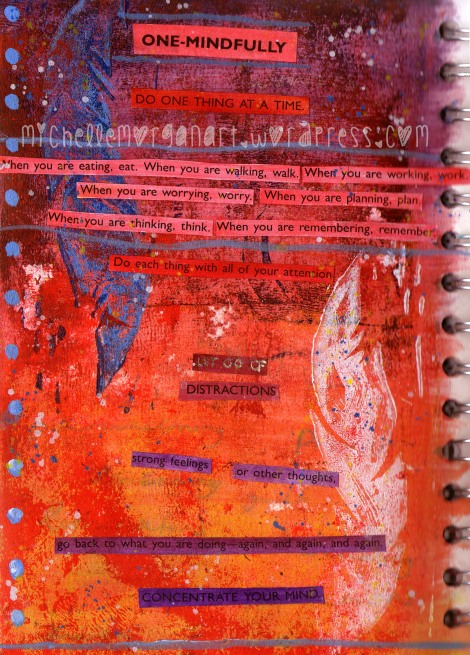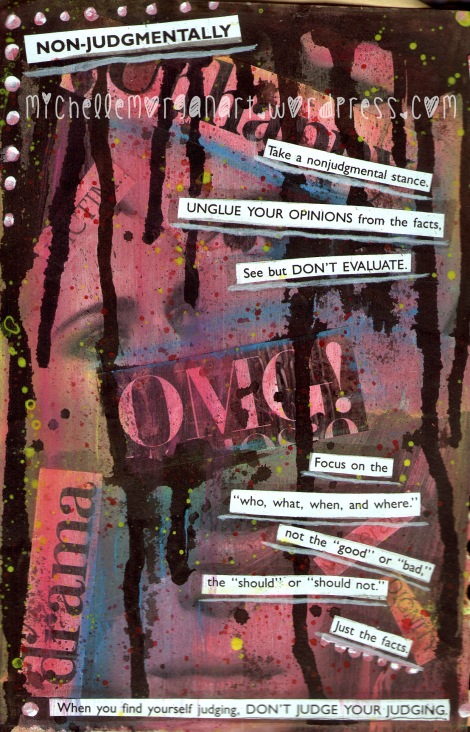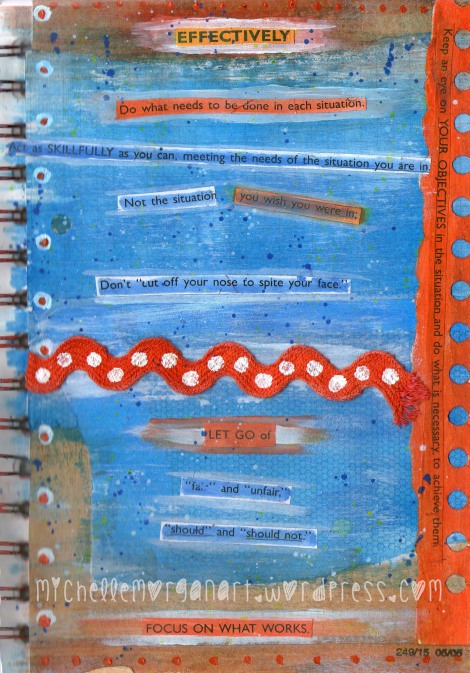DBT Diary: Mindfulness Skills
Last time I posted the DBT diary I explored the principle of wise mind: A skill that helps us consider both our rational and emotional needs, and find the best solution.
However, its not always clear how to use mindfulness to get to wise mind. There’s so much written about mindfulness as a buddhist principle or recovery tool that confusion shrouds the principle and people get caught up in the need to control or find a break in their thoughts.
In DBT the mindfulness skills are used in a different way. Instead of trying to control our thoughts, the aim is to just notice what our thoughts are doing in the present moment.
I created the above journal piece to represent this process, layering many textures, patterns, words and thoughts connectedto mindfullness, before coating them in white to symbolically blend them into the background, and bring out the focal point of the piece and concept- “Just Notice”
When we notice our thought patterns (whether negative, impulsive, self degrading or destructive) we give ourselves the choice to do something differently.
Mindfulness ‘How’ Skills
DBT provides us with 3 mindfulness based skills to help us change our thoughts and behaviour, once we have noticed the destructive patterns. These are called the ‘How’ skills, as they show us ‘How’ to use mindfulness.
One Mindfully
This skill is about focusing your mind, letting go of distractions (external or internal) and literally paying attention to the present moment. One of the most difficult skills to grasp as its not always in our control, but when we can choose to be present, we should do so with all of our attention. Even at the most boring times.
Practicing being aware while you eat, brush your teeth, walk gives you greater ability to be aware when an emotion takes hold, and therefore do the effective thing. In DBT we dont use this skill to distract from thought, but rather to train ourselves to be aware of it.
I journalled this skill by creating a busy and distracting background with layers of splattered paint, ink, pastel and stamping. I then layed text on top.
Practice your one-mindfulness by reading the words on the journal page only – ignoring colour, shape and texture.
How did you find that? Comment below.
Non Judgementally.
This skill helps us to decide which thoughts are fact, and which are negative or self degrading.
For example, if you dont make an appointment, make a mistake in a craft project or dont get the job you interviewed for, it’s common to think “I messed up” or “I’m a failure” or, my personal favourite, “I cant do anything right”
If you notice these thoughts, you can step back from them.
Think/say to your self “I’m just noticing the thought that I cant do anything right, these are just thoughts not facts”
Once you realise these thoughts are not the truth, you can re-focus on the facts of the situation, and do the effective thing! (See below)
I tried to represent this concept in my journal using newspaper and magazine cuttings, mirroring the slanderous and judgemental way our media uses words and imagery to add drama to a story; similarly to how our own minds amplify the trauma of our story.
Effectively
The more you practice wise mind, and non-judgemental mindfulness, the easier effectiveness becomes. But for people still caught up in judgements over what should/shouldn’t be or what is good/bad, effectiveness can be difficult to master.
Imagine you work in a job you despise; its easier and more comfortable to phone in sick, day after day than find a new job. This could eventually lead to all sorts of depressing consequences. (I’ve been fired from several positions for this exact reason!). Your emotional mind says you hate the place, your rational mind says you need the money, and you end up in turmoil day after day.
Wise mind would say both are important, and perhaps the effective thing to do is as for a different position in your company, or look for a new job
By focusing on your wise mind, you can find balance. By letting go of judgements over what you should and shouldn’t be doing, you can find the effective route to your goals.
Are there situations in your life right now where hurt, vengeance, useless anger or righteousness are keeping your from being effective?
Did you find these mindfulness tips useful? Please comment below.
Feel free to share the DBT Diary to anyone who may find it useful! If you need more coaching on these skills please visit DBT Self help by clicking here.
For more art, sign up to my newsletter here!





